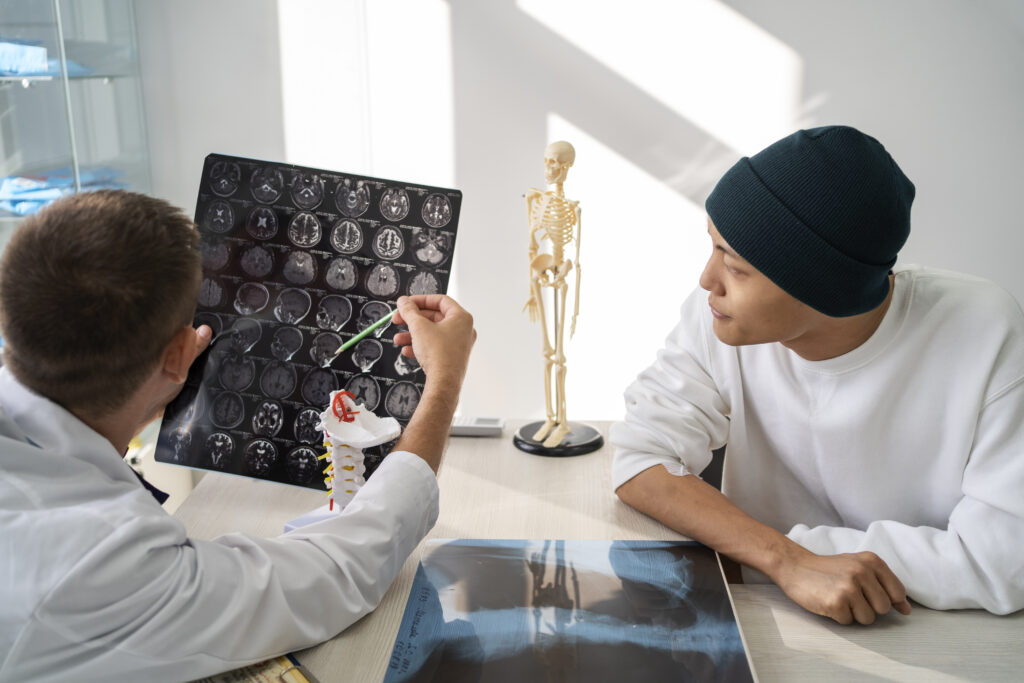About Pituitary Tumors
The pea-sized pituitary gland is located at the base of the brain and is important to the functioning of the human body.
Despite its size, the pituitary gland is responsible for producing hormones that regulate critical body organs and glands, including those that affect body tissues, such as bones and the milk-producing breast glands. Some of these glands include the thyroid gland, the adrenal glands, the ovaries, and the testicles.

Although a minority of these tumors are part of a genetic disorder, the cause of most pituitary tumors is unknown. There are no known environmental or lifestyle-related risks. About 10,000 patients a year in the United States receive a diagnosis of pituitary tumors, which can occur at any age (including in children), but which are most often found in older adults. Almost all of these tumors are benign pituitary adenomas (ie. non-cancerous). If you are seeking expert care, consulting with a Pituitary Tumor Neurosurgeon NJ can help ensure proper diagnosis and treatment.
Pituitary Tumors
The actual number of pituitary tumors, however, may be much higher than the number of tumors that are found each year. Through analyses of other health problems and post-mortem exams, doctors report that as many as 1 in 4 people may have a pituitary adenoma without knowing it. Since these tumors are often small and never cause any symptoms or health problems, few of them would ordinarily be diagnosed.
Cancer of the pituitary gland is rare. Only a few hundred pituitary cancers have ever been recorded, according to the American Cancer Society. Most of those were diagnosed in older people. In the event of a cancerous tumor, however, it is treated with surgery and radiation by a skilled Pituitary Tumor Neurosurgeon in Rutherford NJ or other specialized centers.
Hormone-producing pituitary adenomas produce symptoms related to the hormone action of the body. Clinically non-functioning pituitary adenomas typically cause problems related to tumor growth, which exerts pressure on the surrounding brain structure.
Symptoms of Pituitary Tumors
There are many signs and symptoms of a pituitary tumor, depending on the type of tumor. These include any of the following:
- Extra hormones in the blood
- Headache, vision loss or double vision
- Nausea, vomiting
- Dizziness, confusion, anxiety, lethargy, depression
- High blood pressure, irregular heartbeat
- Nasal drainage of clear fluid (because of cerebrospinal fluid leaking into the nose)
- Abnormal sexual issues
- Abnormal nipple discharge or breast milk issues
- Absent or unusual menstruation
- Excessive body hair, or excessive loss of body hair
- Delayed growth and sexual development in children
- Large hands and feet (acromegaly)
- Breast development in men
- Weight gain
- Easy to bruise
- Facial changes
- Low blood pressure
- Sensitivity to heat or cold
Diagnosing Pituitary Tumors
- the size – if it is smaller than 1 centimeter, it is a microadenoma; larger tumors are macroadenomas.
- whether the tumor has spread to nearby areas or structures, such as the skull
- whether the tumor is causing specific symptoms, such as tunnel vision
- whether it is creating hormones (functional) or not (non-functional)
- which hormone it releases.
- Increased knowledge of the genetic basis of pituitary tumors has improved genetic testing for multiple endocrine neoplasia, type I (MEN1), a hereditary condition that increases the risk of developing tumors in certain glands.
- Advances in MRI imaging has improved the accuracy of finding and diagnosing the tumor size and recurrences.
Pituitary Tumors Treatment
- the tumor is pressing on the pituitary gland or parts of the nervous system
- producing hormones
- unable to be controlled by medication
- still growing despite previous treatments.
Surgery to Remove Pituitary Tumors
Recovery After Pituitary Tumor Surgery
In general, complications are rare after pituitary tumor surgery but if they do occur, they can be serious. Your doctor will explain signs to watch for and what to do if an issue arises.
Treatment involves medication, supplements and waiting until the body adjusts to normal hormone.
Patients who undergo transsphenoidal surgery may experience side effects such as a sinus headache and congestion for a week or two after surgery. It also increases the risk of infection in the nasal passages, so patients are closely monitored.
Other side effects after pituitary tumor surgery include:
- low hormonal levels – this is more likely with larger pituitary tumors or removal of the pituitary gland. Doctors will monitor hormone levels through blood tests and may prescribe hormone replacements when necessary.
- diabetes insipidus – surgery can affect levels of the antidiuretic hormone (ADH). This affects kidney function and results in increased water in the urine. Signs include intense thirst, dehydration, and almost clear urine. Symptoms sometimes resolve on their own within a week or two, or may be treated with medicine.
- vitamin and mineral deficiencies – although these are rare.
- meningitis – it is rare but membranes around the brain (meninges) may become infected. This can occur because the bone between the sinuses and the brain is opened during surgery. However, the opening heals over time and reduces the risk of infection.
